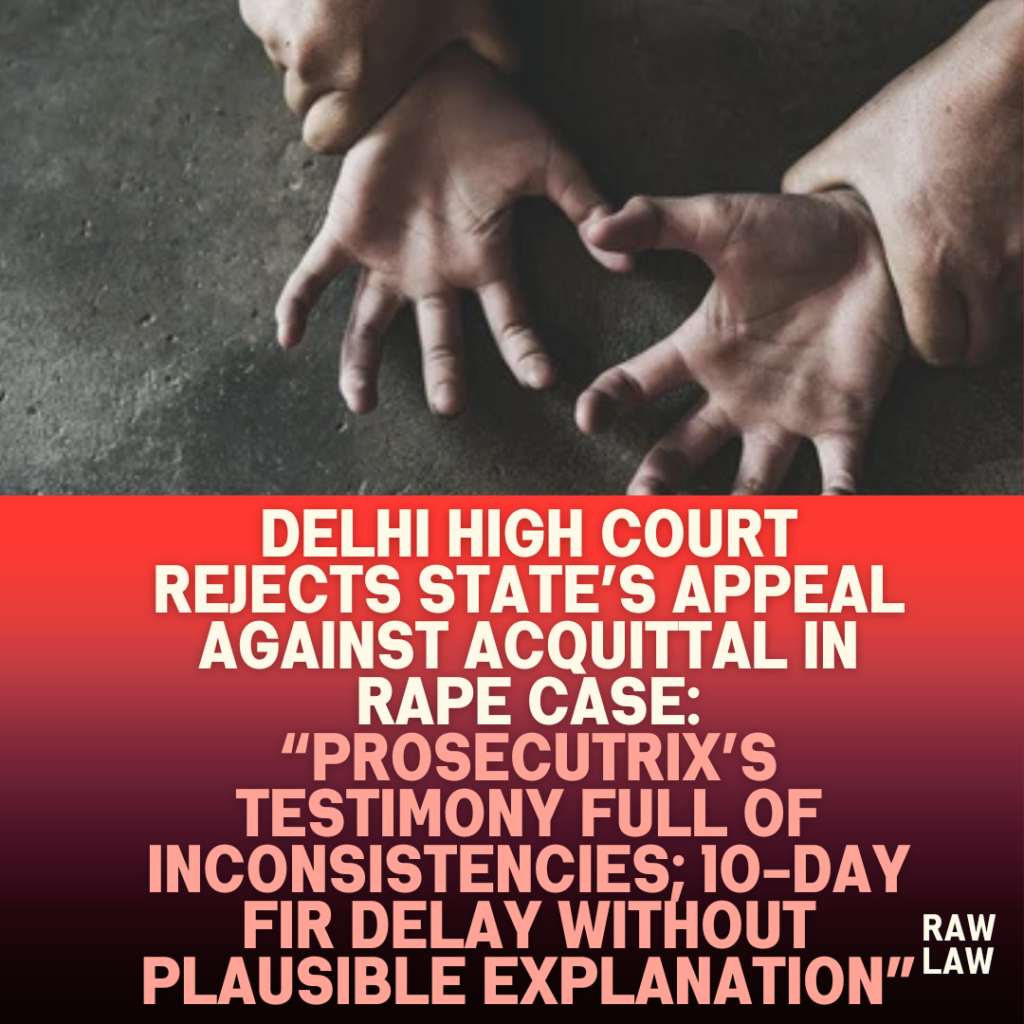Court’s Decision
The Delhi High Court dismissed the State’s leave to appeal under Section 378(3) CrPC challenging the acquittal of the accused in a rape and criminal intimidation case. The Court upheld the Trial Court’s decision, citing “material inconsistencies” in the prosecutrix’s testimony, unexplained delay in lodging the FIR, and contradictions between her and her husband’s statements. The Court concluded that “no prima facie case has been made out in favour of the appellant” and thus declined to interfere with the acquittal.
Facts
The FIR, registered on 10.04.2015, stemmed from an incident alleged to have occurred on 01.04.2015. According to the prosecutrix, she was called early to work by the accused, found no one else at the factory, and was allegedly raped. She further alleged that the accused threatened to kill her family if she disclosed the incident. The delay in reporting was explained as her being afraid, only revealing the incident to her husband nine days later.
The accused denied the allegations, claiming false implication due to prior disputes over salary and overtime. He also stated that the prosecutrix had been asked to leave the factory, prompting a vendetta.
Issues
- Whether the testimony of the prosecutrix was credible and consistent enough to sustain a conviction.
- Whether the delay in lodging the FIR was satisfactorily explained.
- Whether there were substantial and compelling reasons for the High Court to grant leave to appeal against the acquittal.
Petitioner’s Arguments
The State contended that the Trial Court failed to appreciate the reason for the delay in lodging the FIR. It was argued that the prosecutrix’s testimony was consistent with her Section 164 CrPC statement and corroborated by her husband. The State asserted that minor inconsistencies should not overshadow the credibility of the victim’s version, and the Trial Court erred in doubting her conduct.
Respondent’s Arguments
The respondent opposed the petition, maintaining that the Trial Court’s acquittal was based on sound reasoning. He highlighted the contradictions in the prosecutrix’s version and the lack of immediate disclosure despite living in proximity to others, including the landlord. The delay in filing the FIR and the improbability of continued work at the factory after the alleged assault further undermined the prosecution’s case.
Analysis of the Law
The High Court reiterated the principle that interference in acquittals should be rare and only for compelling reasons. Citing Maharashtra v. Sujay Mangesh Poyarekar [(2008) 9 SCC 475], it noted that at the stage of leave to appeal, the court must assess whether any prima facie case or arguable points arise from the impugned judgment. It held that the Trial Court had meticulously examined the inconsistencies and arrived at a justified acquittal.
Precedent Analysis
The judgment primarily relies on:
- Maharashtra v. Sujay Mangesh Poyarekar, (2008) 9 SCC 475 – Emphasized that leave to appeal against acquittal requires a prima facie case and not merely a difference of opinion.
- Moti Lal v. State of M.P., (2008) 11 SCC 20 – Held that conviction can be based solely on the testimony of the prosecutrix if it inspires confidence. However, the Court clarified that in the present case, the testimony lacked such reliability.
Court’s Reasoning
The Court held that:
- There was a 10-day delay in lodging the FIR without a plausible explanation.
- The prosecutrix continued to work at the accused’s factory until 9:30 p.m. on the day of the alleged incident and did not alert anyone, despite being in a building with other occupants.
- Her version that the accused’s wife called her and threatened her was not stated in her earlier statements and emerged for the first time during cross-examination.
- Her husband’s version of threats from the accused’s wife contradicted her own.
- The statement about informing the landlord’s daughter-in-law was uncorroborated as the police failed to examine her as a witness.
In view of these inconsistencies, the Court found no compelling reason to disturb the acquittal.
Conclusion
The Delhi High Court concluded that the prosecution’s case was fraught with inconsistencies and improbable conduct. No new grounds or arguable points were raised to justify interference in the acquittal. Accordingly, the leave to appeal was dismissed, reaffirming the principle that the testimony of the prosecutrix must be consistent and inspire confidence for conviction.
Implications
The judgment reinforces judicial caution in interfering with acquittals, particularly in sexual offence cases where the complainant’s testimony is key. It underscores that while corroboration is not essential, credibility and consistency remain crucial. The Court’s approach balances protection of victim rights with safeguarding against misuse through baseless allegations.
Also Read: Orissa High Court Allows Withdrawal of Plea Challenging Rejection Under Land Acquisition Act



